A Day in the Life of a Bangladeshi Cycle Van Driver
Kamrul opens his eyes and looks out the window. It is still dark outside. He gets up and goes outside his house.
Kamrul washes his face with the water from the nearest pond. He breaks a branch from a nearby neem tree, whose branches are thin and good for teeth, and begins to clean his teeth. He is wearing just a lungi, the traditional Bangladeshi skirt for a male. He prepares himself for the hard day ahead of him. Kamrul, the father of Compassion-registered* child Mukta, is a cycle van puller. (more…)
10 Questions With Dennis Tumusiime
10 questions? Yes. You asked ’em.
10 answers? Yes … kind of. They’re just not all in this post.
Here we go. 10 Questions With Dennis Tumusiime, a tours and visits specialist with Compassion Uganda.
1. Do the families that Compassion works with have a pretty good understanding about what the program entails, and are they open to their children being evangelized? Is there a balance between being so desperate that they feel they must enroll their children and thus expose them to the gospel in order for them to be educated and fed? (Kalaya G)
I’d say that 80 percent of the communities where child development centers are located have an understanding [at least partially] of our program components. There have been instances where children are denied the benefits of the programs by their parents because the parents have different beliefs and norms, but like you said, they are compelled to enroll the children because of lack of supplies to the children’s needs.
2. What are the qualifications for the project workers to work at the child development centers? (Kayla)
Each position, be it health, finance, or sponsor donor ministry has a professional element that an aspiring candidate should have. But Compassion also has a holistic approach to the work we do, and the same idea applies to the workers in the child development centers; they should be holistically qualified –- not just academically qualified. The applicant’s spiritual status matters, and it is paramount.
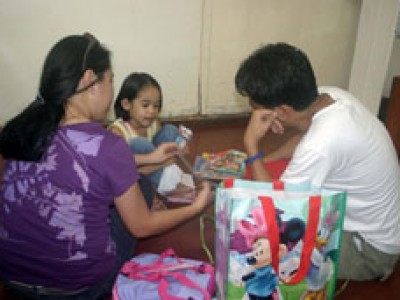
What Does Sponsorship Mean? (I Didn’t Think I Would Cry)
I know poverty. I have lived with it. So I wasn’t expecting anything out of the ordinary on my way to Shan’s house. I was carrying two bags of groceries as I negotiated my way through the crowded neighborhood. Then I stopped. I literally felt a thud on my heart and tears began to roll.
10 Questions With Edwin Estioko
Recently, we gave you the chance to ask Edwin Estioko, our Field Communication Specialist in the Philippines all your burning questions about himself, the Philippines and Compassion in the Philippines. Here are his answers …
1. Can you tell about the time when you first decided to work for Compassion? (Catherine)
Before Compassion I was production manager for OMF Literature (the biggest Christian publisher in the Philippines) and a writer of children’s books. I grew up at church serving and teaching little children; playing with them and just enjoying their company. When I saw the ad for a Communications Specialist for Compassion International in the Philippines, I was literally drawn in. Feeling a strong sense of peace and confidence that the Lord was calling me to this beautiful ministry for children, I applied for the post and on the same week filed for resignation from OMF despite not knowing for sure whether Compassion would hire me or not. Thank God they did.
2. What goals do you hope to accomplish in your area? (Jason)
I hope that through the photographs I take and stories I write about Filipino children I could reach as many readers as I can around the world so that more and more people would stand up for children and advocate for them, so that more and more could see that thousands of children and families here in the Philippines truly lack opportunities for a better life (or simply for a livable minimum) despite the fact that they are hard working and full of faith.
What drives me is Proverbs 31:8, “to speak up for those who cannot speak for themselves.”
3. What have been the toughest times of your life, and what have you learned from these trials? (Juli Jarvis) (more…)
The Case for Compassion Togo
Today, we’re beginning a four part series to introduce you to Togo, the newest country Compassion works in. The Compassion office is now open, and the staff are working to begin registering children in the fall.
An Overview of the Country
Located in West Africa, Togo has a southern coastline that borders the Bight of Benin. Togo’s western neighbor is Ghana, eastern neighbor is Benin and northern neighbor is Burkina Faso.
Slightly smaller than the state of West Virginia, Togo is home to 5.7 million people — 42 percent of whom are under the age of 15. Located on the coast, just across the border with Ghana, the capital city of Lome has a population of approximately 850,000.
French is the official language of Togo and also the language of commerce. There are four other main languages of the country: Ewe and Mina in the south and Kabye and Dagomba in the north.
An individual from Togo is called a Togolese. There are 37 tribes within the country. Approximately 51 percent of the population practices indigenous religious beliefs, while 29 percent are Christian (either Protestant or Catholic) and another 20 percent are Muslim.
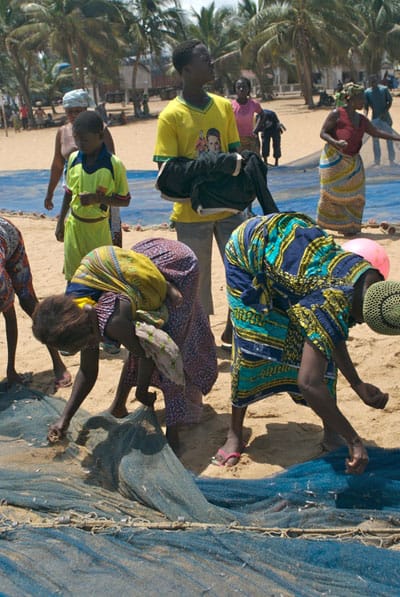
Commercial and subsistence agriculture provide employment for about 65 percent of Togo’s population. Many families turn to “petty trading” — street vending — in an attempt to support themselves. Due to the economic instability of the country, there are numerous stories of civil employees only being paid for one out of three or four months of work. This includes teachers, many of whom are trying to oversee classrooms of more than 100 students. As a result, there are also stories of teachers requiring students to pay a small bribe in order for the teacher to actually teach lessons.
Political and economic troubles have led a growing number of the rural population to migrate to the urban areas, which in turn has led to a growing number of social problems within the cities. As is often the case, children seem to be the most negatively affected by these trends.
TOMORROW: The State of the Children
The famous and multi-talented Phoebe Rogers lives in Kigali, Rwanda. She is the regional trainer for Africa, wrote these Togo posts, took the photos and has the longest title know to humankind. It’s something like: Africa Regional Communication, Tours and Visits Learning and Support Specialist. Basically, she trains and supports the Africa region’s communication specialists and tour and visits specialists.
Ask the Field: Uganda and the Philippines
Have you ever wondered what it’s like to live in the country where your sponsored child lives? What it’s like to work for Compassion? What gets the people going who do this work each day? If so, now’s your chance to “Ask the Field!”
Ask your burning questions of our staff from around the world about their country, their work — whatever you want to know. I’ll choose 10 of your questions for them to answer. (Being the protective mother bear that I am, I’ll make sure to choose culturally appropriate questions. What’s polite dinner conversation in the U.S. may not be appropriate in their country, so keep this in mind as you ask.)
I’d like to introduce to you Dennis Tumusiime and Edwin Estioko.
 Dennis is a native of Uganda and works as a tours and visits specialist for Compassion International Uganda. (Did you know that Compassion doesn’t send a bunch of Americans over to other countries to minister to the children, but works through natives of that country so they can culturally contextualize the ministry? That’s pretty cool.) Anyway, Dennis has been working for two years with Compassion to coordinate and plan visits from sponsors and donors to Uganda. (So, if you visit Uganda, you’ll probably get to see that smiling face!) Coordinating all these trips means he’s quite an adventurous man.
Dennis is a native of Uganda and works as a tours and visits specialist for Compassion International Uganda. (Did you know that Compassion doesn’t send a bunch of Americans over to other countries to minister to the children, but works through natives of that country so they can culturally contextualize the ministry? That’s pretty cool.) Anyway, Dennis has been working for two years with Compassion to coordinate and plan visits from sponsors and donors to Uganda. (So, if you visit Uganda, you’ll probably get to see that smiling face!) Coordinating all these trips means he’s quite an adventurous man.
 Edwin Estioko began working for Compassion six years ago and is originally from Quezon City, Philippines. He is Compassion’s Field Communication Specialist in the Philippines and writes stories about and takes pictures of the ministry that is happening through Compassion International Philippines. He is married with no kids, so he and his wife can easily consider all the Compassion children as their own.
Edwin Estioko began working for Compassion six years ago and is originally from Quezon City, Philippines. He is Compassion’s Field Communication Specialist in the Philippines and writes stories about and takes pictures of the ministry that is happening through Compassion International Philippines. He is married with no kids, so he and his wife can easily consider all the Compassion children as their own.
Dennis and Edwin are excited to answer your questions, so ask away!
Dear Good Samaritans
I am very proud that I am alive so that I can witness and testify to the love of God through Compassion’s ministry in our area.
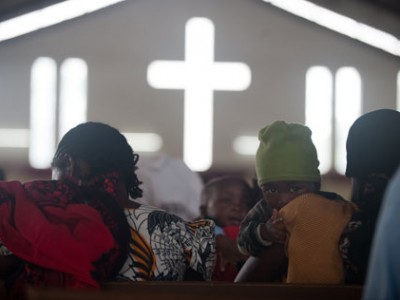
Overcoming Denominational Differences in Tanzania
About nine years ago, when Compassion began operating in Tanzania, we were received with mixed feelings by the church.
Some thought there is no genuine organization that can offer the benefits CI claims to offer to children. Some were not comfortable that we want different evangelical denominations to come together and have a common objective in releasing children from poverty in Jesus’ name.
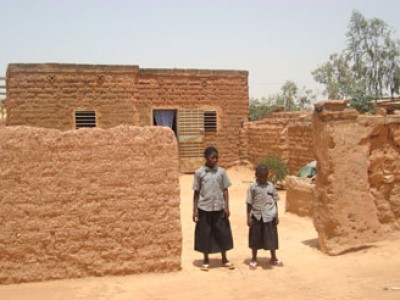
Finding Christ in Burkina Faso
It was noon when I reached the family’s house. There was too much sun. Rasmata and Aguirata were sitting with their mother, Fati, in the small living room because there was no shade outside. Only a small tree that was planted by Aguirata could be seen in the courtyard.
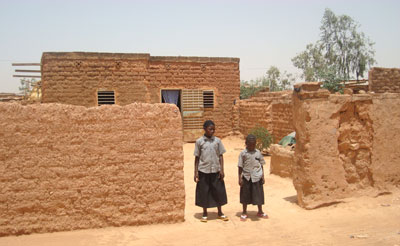
The family lives in an area that lacks services — no water, no electricity and no telephone. The courtyard has no doors; thieves stole them. The family even keeps their firewood in the living room so thieves cannot carry it away.
Because of the lack of services, life is very hard. People are obliged to walk kilometers to queue for hours to buy water. During the dry season, a barrel of water costs between $1 and $2. It often happens that people even fight to get some water.
The mother used to wash clothes to earn money but could not earn enough to feed the family. Then her husband passed away. It was such a shock to Fati that she almost went crazy. Because of her psychological problems, she could not work.
Fati was desperate to care for her children. It was a big relief when the Compassion child development center registered her daughter Rasmata, but it wasn’t enough — the need was still there. Rasmata’s little sister also needed help. A member of the center’s management committee who was aware of this family’s condition pleaded to the leadership team and was able to get Aguirata registered too.
Yet, all the effort was about to fail. The late husband’s brothers came from the village to take Rasmata and Aguirata. The reason: the mother was unstable psychologically and could not take good care of her daughters. But taking them to the village would mean putting an end to the opportunity they had to go to school and have free access to health care.
But God was in control. The child development center team leader met the men and told them about all the benefits the girls would have if they continued attending the center. After several days of negotiations, the men came to understand the wonderful opportunity the children had and decided to let them stay.
For Fati, there has been a great change since her two daughters joined Compassion.
“I am grateful and do not even know how to thank the Compassion project for the huge relief. In the past, it was hard to have even a meal a day. Today, thanks to the project, we are able to eat two to three times a day. Besides, my daughters’ school fees are paid for by the project. I could not believe that someone could help me raise my children freely, without asking anything.”
The center activities have brought so many changes in the lives of Rasmata and Aguirata. According to their mother, they used to be very intractable, but since their registration, they have been kind and obedient, and she believes that all this has been possible thanks to the biblical input.
In fact, when the girls started going to the center, they were Muslim, along with their mom. Whenever they came back from the program activities, they would start singing Christian songs, and would pray before eating or going to bed. Their mother was wondering what was happing to her daughters, but was very happy with the great change in their behavior.
“At that time I could not believe that I myself would be Christian,” Fati said, smiling.
What convinced her to give her life to Jesus was Compassion taking care of her daughters with no ulterior motives. “The woman came to the project office one day with tears and told me that she wanted to give her life to Jesus in whose name the project was bringing up her daughters,” the project team leader said.
Without Compassion this family would have fallen apart, but now Fati and her two little daughters have come to Christ.
Aguirata told us that she would like to become pastor to preach the gospel. As for Rasmata, she would like to become a nurse to treat the sick.
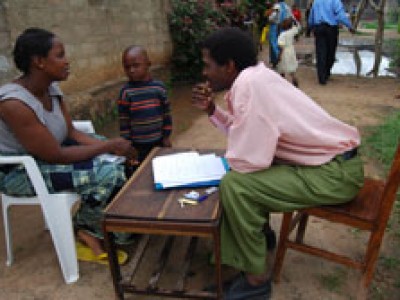
Historic Registration in Tanzania: The 50,000 Registered Child
Compassion International Tanzania (CIT) registered* its 50,000 child two months ago on Februray 16.
This historic registration ushered in a new era for us. It was a moment to put down our tools, celebrate the Lord’s favor, and thank Him for what he has done and for His faithfulness. It was a milestone for the Tanzanian ministry, an achievement worth celebrating.
Now let’s see how we reached the 50,000 child mark and also learn about how our child registration process works.
The milestone occurred in Tabora, more than 650 kilometers from Arusha, where the head office of CIT is located. But the search actually began months earlier.
Finding Church Partners
Before going into a new area, CIT conducts country mapping to determine the level of poverty in one area as compared to another. Country mapping is necessary so we can determine where the greatest ministry need is.
After country mapping, we conduct a baseline survey to determine if the areas identified with a high degree of poverty have Christian churches whose mission matches ours.
This is critical because we work through the local church — it is the local church that actually implements the program and cares for the children. If there is no church, our ministry model won’t work, regardless of the degree of poverty that exists there.
We ask questions, such as:
- Does the church have classrooms to accommodate the children?
- Do they have people who can teach and work with children or who can learn to assist children?
- Are there peopleand children who can help the program continue?
This baseline survey helps us decide which areas and churches are a good fit. Of course, in all the stages we keep praying and asking God to lead us in the right path and to bring people who will be willing to sponsor children and release the resources needed.
After the baseline survey, we gather all the potential church partners for vision casting. In this gathering we share the importance of ministry to children and call on the church to awaken to the call of Jesus Christ to fulfill the Greatest Commandment.
After this, we choose the potential church partners and invite them to a partnership meeting. At this one-day meeting, it is time to pray together and for us to give relevant partnership documents to the new church partners.
If the partners agree on the conditions, they sign a partnership agreement with us. These partnership agreements give room to church partners to start preparing environments to begin the ministry. They start recruiting project workers and create a child ministry committee formed from church members.
The church has to find those able and qualified to work in the project as project coordinator, project accountant, project social worker, and project health worker.
Once all the project workers are chosen, they attend the “One-Month Child Ministry Foundation Course” that all project workers go through.
In this course, the newly recruited project workers are trained on how to implement the ministry and how to minister to each child individually.
They also learn what is expected of them and different ways and procedures of reporting and giving feedback to us. They get to know the organizational structure of CIT, the departments involved, and how each department works.
Screening and Registration
All this leads up to child screening and registration. (more…)
Inside Uganda With Dr. Yona Kapere
If you’ve been following our 15 Christian bloggers on their trip to Uganda you’ve seen only a glimpse of what it’s like to live in extreme poverty. It’s an outside view of Compassion’s ministry.
Today we present part three in a series of blog posts from staffers of Compassion Uganda who will give you an inside look into how Compassion’s ministry operates among the poorest of the poor.
Have you ever wondered who cares for the medical needs of children registered with Compassion? Especially those living in rural communities with no doctors or hospitals?
Each Compassion center has, as part of its staff, a health specialist. This person provides medical guidance for each child registered in the program and arranges for doctors’ visits, immunizations and preventive care.
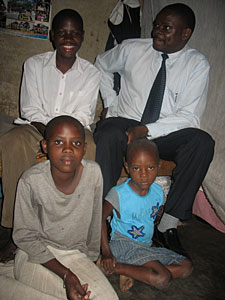
Dr. Yona Kapere is the Senior Health Specialist for Uganda. Here, he shares his role within Compassion and the success he has seen.
As a health specialist, I am involved mainly in equipping the church partner staff to ensure that the supported children choose good health practices and are physically healthy. We mainly achieve the above through networking with other existing service providers.
We use field reports and monitoring visits to identify disease trends, gaps and challenges at the implementation level, and support the field to make a difference in the lives of the most vulnerable children.
The most energizing bit of my work is that I have the opportunity to witness the difference our interventions are making in the lives of children and caregivers.
During one of our project monitoring visits, we came across an adolescent who had given up on life because he was HIV-positive. But with the support from Compassion through the church partner, the life of this adolescent was restored and he is currently feeling much better because of the medicine we are able to provide for him.
He is attending school and educating his peers on HIV/AIDS.
This youth had this to say:
“I had given up on life because no one seemed to understand me, but with the support of the church staff I was taken through counseling, and I have hope that I will leave to complete my studies and become an engineer.”
To those who support us to implement these programs, thank you for restoring hope to the hopeless. Many are alive and will continue to live because of your support.
Inside Uganda With Patience Musiime
If you’ve been following our 15 Christian bloggers on their trip to Uganda you’ve seen only a glimpse of what it’s like to live in extreme poverty. It’s an outside view of Compassion’s ministry.
Today we present part two in a series of blog posts from staffers of Compassion Uganda who will give you an inside look into how Compassion’s ministry operates among the poorest of the poor.
The Child Survival Program (CSP) serves caregivers, infants and toddlers in some of the world’s poorest communities. Caregivers enrolled in CSP are visited each week by dedicated staff, whose passion is to bring health and healing to homes affected by poverty. Patience Musiime, a CSP specialist in Uganda, shares her favorite stories of hope from the Child Survival Program.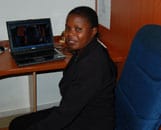
In 2004, Uganda opened our first Child Survival Program. At the Bugongi CSP, we have seen so much happen in just four years. In the Bugongi CSP, all of our 20 pregnant mothers have given birth to bouncing, healthy babies. This is a miracle! In Uganda, 200,000 children under the age of 5 die every year. But the babies in CSP are living!
In Uganda’s CSPs, we first understand that a mother must be healthy if she is to take care of her children. So we make sure our mothers go to a licensed health care center for their medical care, both before and after the baby is born. Since hundreds of thousands of mothers and children in Uganda are infected with AIDS, we also make sure to teach our mothers about protecting themselves and their families from this disease. For mothers who have HIV, we arrange medical care and teach them income-generating activities. But CSP is not just about caring for a family’s physical needs. We believe spiritual poverty is just as deadly as physical poverty.
In the first year that the Bugongi CSP was open, two mothers made a commitment to Christ. Today, 75 of our mothers know Christ as their Savior. These mothers are able to attend Bible studies, discipleship classes and home fellowships. Also, when we visit the homes of these mothers, we pray with them and help them understand how much Jesus loves them.We believe that we can end poverty for the families in our Child Survival Programs. If we can teach our mothers income-generating activities, they can help support their families and gain confidence.
Bugongi CSP runs an adult literacy class, and 26 mothers who formerly could not read and write now write their names, do simple arithmetic. and read in the local languages. Five mothers have successfully graduated with certificates in fashion and design. Mothers are also given skills in crocheting and home baking.
If you could visit us at the Bugongi CSP, I would introduce you to so many of our mothers whose lives have been changed. You would meet Mary, mother to Doreen, who tells us, “CSP has helped me through parenting seminars to attain parenting skills. My child now looks healthy. I have learned to read and write. I now can write my name. I gave my life to Christ through evangelism sessions in CSP.”
And you could meet Anne, who is enrolled with her twins Angel and Andrew. She told me, “CSP has done a lot in my life. I have learned how to prepare a rich meal for my children, the importance of immunization and how to live peacefully with other people. I can now talk in public and I really love my children, play with them and teach them.”
CSP is changing lives. So far, we have witnessed 46 of our children transfer to the sponsorship program. These children are well developed physically, spiritually, socially and mentally. All because there are CSP partners who believe in releasing children from poverty in Jesus’ name.


